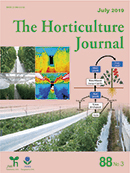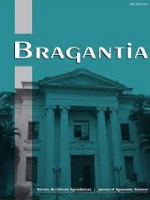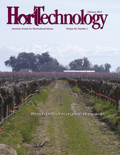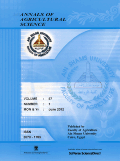
EUROPEAN JOURNAL OF HORTICULTURAL SCIENCE
Scope & Guideline
Pioneering research for the evolution of horticultural science.
Introduction
Aims and Scopes
- Plant Physiology and Biochemistry:
Research on physiological processes and biochemical pathways in horticultural crops, including stress responses, nutrient uptake, and metabolic pathways. - Crop Management and Cultivation Techniques:
Studies focusing on various agricultural practices, including irrigation, fertilization, pruning, and the impact of these practices on yield and quality of horticultural products. - Genetics and Breeding of Horticultural Crops:
Exploration of genetic diversity, breeding techniques, and the development of new cultivars with improved traits such as disease resistance, drought tolerance, and enhanced nutritional value. - Postharvest Technology and Quality Management:
Investigations into postharvest handling, storage, and processing techniques to extend shelf life and maintain quality of horticultural products. - Sustainable Practices in Horticulture:
Research emphasizing environmentally friendly and sustainable practices, including the use of biostimulants, organic farming, and integrated pest management. - Technological Innovations in Horticulture:
Application of modern technologies such as precision agriculture, drone technology, and genetic engineering to improve horticultural production.
Trending and Emerging
- Genomic and Molecular Techniques in Crop Improvement:
There is an increasing trend towards the use of genomic and molecular approaches for crop improvement, including CRISPR and other gene-editing technologies to enhance desirable traits. - Abiotic Stress Tolerance:
Research focusing on the mechanisms of plant responses to abiotic stresses, such as drought, salinity, and temperature extremes, is gaining prominence due to the challenges posed by climate change. - Sustainable and Organic Horticulture:
A growing emphasis on sustainable farming practices, including organic horticulture and the use of biopesticides and biostimulants, reflects a shift towards environmentally responsible production methods. - Precision Agriculture Technologies:
The integration of precision agriculture technologies, such as remote sensing and data analytics, is becoming increasingly important in optimizing crop management and resource efficiency. - Plant-Soil Microbiome Interactions:
Emerging research into the interactions between plants and soil microbiomes is gaining traction, highlighting the importance of microbial communities in enhancing plant health and productivity.
Declining or Waning
- Traditional Horticultural Practices:
There is a noticeable decline in research related to conventional horticultural practices, such as traditional pest control and soil management techniques, as newer sustainable methods gain popularity. - Generalized Crop Production Studies:
Papers that focus solely on generic crop production without specific innovations or technological advancements are becoming less frequent, suggesting a shift towards more specialized and innovative research. - Historical Studies of Horticulture:
Research focusing on historical practices or the evolution of horticultural techniques is waning, possibly overshadowed by contemporary research that addresses current challenges and innovations. - Basic Plant Taxonomy:
The emphasis on basic taxonomic studies of horticultural plants is decreasing, as more applied and technological approaches dominate the research landscape.
Similar Journals

Horticulture Journal
Sowing Seeds of Innovation in Plant ScienceThe Horticulture Journal, published by the Japan Society for Horticultural Science, is a leading academic platform dedicated to the advancement of horticultural research and practices. With an ISSN of 2189-0102 and an E-ISSN of 2189-0110, this journal endeavors to publish high-quality research that emphasizes innovative techniques, sustainable practices, and the science of plant cultivation. The journal has been recognized for its impact within the field, currently holding a Q2 ranking in Horticulture and a Q3 ranking in Plant Science as of 2023, indicating its significant contribution to advancing knowledge. With its open-access model, researchers, professionals, and students have the opportunity to engage with the latest findings, thanks to the journal's commitment to widespread dissemination of information. Since its convergence period began in 2015 and continuing through to 2024, the Horticulture Journal remains instrumental in promoting sustainable and beneficial practices in horticulture science globally.

BRAGANTIA
Connecting Research to Real-World ImpactBRAGANTIA, published by the Instituto Agronômico, is a distinguished open access journal that has been a vital resource since its inception in 1977. With an ISSN of 0006-8705 and E-ISSN 1678-4499, this journal is recognized for its contributions to the field of Agricultural and Biological Sciences, where it currently holds a respectable Q2 ranking as of 2023. Additionally, BRAGANTIA is indexed in various databases, supporting its impact within Materials Science (Q3 ranking). Positioned in Brazil, the journal promotes the dissemination of high-quality research, aiming to bridge the gap between academia and practical applications in agricultural innovation and sustainability. Researchers, professionals, and students looking to keep abreast of recent advancements and their implications will find BRAGANTIA to be an indispensable platform for sharing and accessing vital agricultural knowledge.

HORTTECHNOLOGY
Advancing horticultural innovation for a sustainable future.HORTTECHNOLOGY is a premier open-access journal published by the American Society for Horticultural Science, focusing on innovative research and advancements in the field of horticulture. With an ISSN of 1063-0198 and an E-ISSN of 1943-7714, this esteemed journal has been disseminating valuable information since 1993 and continues to be a key resource with a convergence period extending to 2024. HORTTECHNOLOGY holds a reputable position in the academic community, classified in the Q2 quartile for horticulture, reflecting its significance and quality within the discipline. Its current Scopus rank places it at 49 out of 115 within Agricultural and Biological Sciences - Horticulture, positioning it in the 57th percentile. Researchers, professionals, and students alike benefit from the accessible research findings this journal offers, addressing critical challenges and advancing knowledge in horticultural practices. HORTTECHNOLOGY is committed to fostering scientific progress and open dialogue within the horticultural community, making it an invaluable resource for anyone passionate about the field.

ANNALS OF AGRICULTURAL SCIENCES
Leading the Way in High-Impact Agricultural ResearchANNALS OF AGRICULTURAL SCIENCES, published by Elsevier, stands as a leading open access journal dedicated to the multifaceted field of agricultural sciences. Since its inception in 2011, this journal has served as a pivotal platform for the dissemination of high-quality research, covering areas such as agronomy, animal science, horticulture, food science, plant science, and soil science. With an impressive Q1 ranking across multiple disciplines and notable positions in Scopus Ranks—including #6 in Animal Science and Zoology and #3 in Horticulture—this journal is recognized globally for its significant contribution to advancing agricultural innovations. The journal caters to a diverse audience of researchers, professionals, and students, providing them with open access to cutting-edge studies that address critical issues in agricultural productivity and sustainability. Its commitment to high-impact research ensures that articles contribute meaningfully to the scientific community, fostering advancements in agricultural practices and policies.

Plant Science Today
Exploring the frontiers of plant science innovation.Plant Science Today is a prominent journal dedicated to advancing the field of plant sciences through innovative research and comprehensive reviews. Published by HORIZON E-PUBLISHING GROUP in India, this open-access journal has been actively disseminating knowledge since its inception in 2018, with a convergence period extending to 2024. With an ISSN of 2348-1900 and a growing reputation, it is categorized in various quartiles for 2023, notably achieving Q3 in Biochemistry, Genetics and Molecular Biology (miscellaneous), while it holds Q4 rankings in critical fields including Ecology and Plant Science. As a valuable resource for students, researchers, and professionals, Plant Science Today aims to inspire discussion and innovation in the realm of ecological and plant science disciplines, where it currently ranks within the lower percentiles in prominent categories such as Environmental Science and Agricultural and Biological Sciences. The journal serves as a crucial platform for the exploration of experimental and theoretical advances, fostering a community eager to explore plant biology's complexities.

Journal of Horticultural Sciences
Fostering Global Discourse in Horticultural Excellence.The Journal of Horticultural Sciences, published by the Society for Promotion of Horticulture (SPH) in India, serves as a vital platform for the dissemination of research in horticulture and related fields. With an ISSN of 0973-354X and an E-ISSN of 2582-4899, this open-access journal has been committed to advancing horticultural knowledge since 2006, allowing researchers to share their findings widely and facilitate significant advancements in the discipline. The journal's influence is reflected in its current category quartile rankings, designated as Q4 in Ecology, Evolution, Behavior and Systematics, Horticulture, and Plant Science for 2023, illustrating its developing reputation within the academic community. It is important to note the journal's Scopus ranking in the field, where it ranks #111 in Horticulture and #709 in Ecology, marking it as a niche publication with potential for growth. As it converges years from 2019 to 2024, this journal aims to further engage scholars, professionals, and students by focusing on innovative research and breakthroughs in horticultural sciences, thus contributing to the global discourse in sustainable agriculture and environmental stewardship.

Revista Ciencia Agronomica
Transforming research into real-world agricultural solutions.Revista Ciencia Agronomica is a leading open access journal published by the Universidade Federal do Ceará, Departamento de Geociências, dedicated to advancing the field of agricultural sciences. Established in 2008, the journal has emerged as a significant platform for the dissemination of original research and innovative advancements in areas including agronomy, horticulture, and soil science, with a dedicated convergence of years extending to 2025. With an impactful presence in academic circles—ranking in Q3 for Agronomy and Crop Science and Soil Science and Q2 for Horticulture in 2023—this journal provides vital insights for researchers and practitioners alike. Although specific HIndex metrics are currently unavailable, the journal's Scopus rankings attest to its relevance, placing it in the 52nd, 44th, and 43rd percentiles across multiple pertinent categories. Since transitioning to an open access model in 2010, Revista Ciencia Agronomica has committed to maximizing the reach and impact of its published work, thereby ensuring valuable contributions to global agricultural knowledge.

Agrivita
Empowering researchers to cultivate groundbreaking agricultural insights.Agrivita is a distinguished, open-access journal dedicated to advancing research and knowledge in the fields of Agronomy and Crop Science. Published by Brawijaya University, Faculty of Agriculture, this journal has been providing a platform for high-quality scholarly articles since 2010. Located in the vibrant country of Indonesia, Agrivita plays a vital role in the exchange of innovative agricultural research, particularly within the Southeast Asian context. As of 2023, it holds a respectable Q3 ranking in its category, showcasing its commitment to scholarly excellence and visibility. With an increasing impact on the academic community, and its current Scopus rank placing it in the 48th percentile, Agrivita stands as a crucial resource for researchers, professionals, and students eager to deepen their understanding of crop science and agronomy. The journal's scope encompasses cutting-edge research that addresses both fundamental and applied aspects of agriculture, ensuring it remains relevant to today's pressing agricultural challenges. Its open access model enhances global accessibility, fostering a collaborative environment where diverse opinions and findings can converge.

Scientific Papers-Series B-Horticulture
Nurturing Ideas, Harvesting Solutions in Horticulture.Scientific Papers-Series B-Horticulture is a distinguished open-access journal published by the University of Agronomic Sciences and Veterinary Medicine Bucharest. With its ISSN 2285-5653 and E-ISSN 2286-1580, this journal has been accessible to the global research community since 2002, ensuring that vital horticultural research reaches a wide audience without barriers. Positioned at the forefront of the horticultural sciences, the journal serves as a platform for original research, reviews, and innovations pertaining to horticultural practices, plant physiology, and sustainable agriculture. Its contributions are not just significant in Romania but also resonate through the international scientific community, helping to address pressing agricultural challenges. The office located at 59 Marasti Boulevard, District 1, Bucharest 011464, Romania, symbolizes its commitment to advancing horticultural knowledge and fostering collaboration among researchers, professionals, and students alike. With no current H-index data, the journal invites continued contributions to enhance its visibility and impact in the field.

Acta Scientiarum Polonorum-Hortorum Cultus
Pioneering Research in Horticultural Excellence.Acta Scientiarum Polonorum-Hortorum Cultus is a notable open-access journal dedicated to the field of horticultural science, published by UNIV LIFE SCIENCES LUBLIN in Poland. Since its inception in 2002, it has aimed to disseminate high-quality research findings, innovative methodologies, and advancements in the horticultural sector. The journal is indexed in Scopus and has ranked in the 33rd percentile for Horticulture and the 25th percentile for Plant Science, indicating its growing influence and relevance within the scientific community. Despite the challenges presented in quartile categorizations, Acta Scientiarum Polonorum maintains a commitment to cultivating knowledge and fostering collaboration among researchers, professionals, and students in the agricultural and biological sciences. With its publication timelines spanning from 2008 to 2024, the journal serves as a vital resource for those interested in the latest horticultural trends, sustainable practices, and scientific inquiries that drive the field forward.